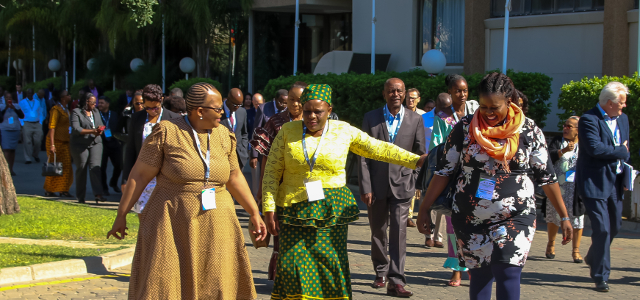Speaking during the SADC Gender Special Session at the 8th SADC River Basin Organisations (RBOs) Workshop in Namibia, Dr. Joseph Pitso, Head of the SADC Gender Unit said the main focus of the Gender Mainstreaming key result area is to mainstream gender into all sectoral policies, programmes and activities at national and regional level through gender responsive planning and budgeting initiatives, policy development and implementation, gender capacity building and training, and the collection of gender disaggregated data.
He noted that gender equality, as a human right and development goal, can only be achieved if its principles are effectively mainstreamed in all the pillars and key sectors of the SADC Regional Integration Agenda to have a multiplier effect that will cascade to all levels and realize the intended goals.
“When we talk about mainstreaming a gender perspective in our work, we are talking about both a strategy and a process that requires new thinking as well as adding a rich, new dimension to our analysis and decision-making,” Pitso said.
He said that Gender Mainstreaming is implemented by ensuring that the values and principles that foster gender equality and equity are systematically infused and entrenched in all aspects of SADC organizational culture such as policies, programs, projects, rules, leadership and management styles, staff recruitment procedures, appointments and promotions, terms and conditions of employment, disciplinary measures, staff development and conflict resolution strategies and processes.
Dr. Pitso said the Gender Unit works with all directorates through Gender Focal Points to ensure that “we continue to develop our Gender Equality and women empowerment policy and work strategically to achieve real change”.
The main objective of the Gender Special Session at the 8th SADC RBOs Workshop was to reflect on the RBO theme “Securing Strategic Investments to realise the benefits of transboundary water cooperation” from a gender perspective. The Special Session was attended by Gender Focal Points in the Ministries of Water and Gender Machinery from the Ministries responsible for Gender from the SADC Member States. The Okavango River Basin Commission (OKACOM) Programmes Manager, Mr Sekgowa Motsumi highlighted that the vision of the Cubango-Okavango River Basin (CORB) based on the agreed type of cooperation within OKACOM, was “economically prosperous, socially just and environmentally healthy development of the Cubango-Okavango River Basin”. He therefore highlighted the need to address imbalances within the Basin and between Member States and imbalances between societal strata in order to sustain a shared prosperity and ensure that targeted investments move the basin towards greater equity.
The 8th SADC RBOs Workshop was convened by the Permanent Okavango River Basin Water Commission (OKACOM), in collaboration with the SADC Secretariat, Directorate of Infrastructure - Water Division and Global Water Partnership Southern Africa (GWP SA) and hosted by the Government of Namibia, one of OKACOM’s riparian states.
Participants deliberated on the role of RBOs in facilitating inclusive investments in river basins, the gender inclusion opportunities that would be presented if RBOs secured strategic investments and how participation and institutionalisation of gender practices can be ensured if RBOs secured and implemented strategic investments.
Dr Pitso highlighted that “While gender mainstreaming is an essential tool, it must be combined with special measures for gender equality as enshrined in article 5 of the Revised SADC Protocol on Gender and Development. This dual approach is necessary to move ahead on gender equality. While we must include a gender perspective when formulating reforms and developing policy we must also be willing to implement specific policies and actions - and spend money - targeting gender inequality.”
He noted that gender mainstreaming is a strategy – a strategy of participation – that brings together the concerns, knowledge and experiences of women and of men in the design, implementation, monitoring and evaluation of our organization’s/sectors policies and programmes and strategic investments. It ensures that women and men benefit equally, and that inequality and inequitable outcomes are not perpetuated.
Mr. Christopher Munikasu, Chief Development Planner in Water Affairs in the Ministry of Agriculture, Water & Forestry of Namibia said there are tangible benefits in mainstreaming gender in water resources management and that as specialists we have to plan as one to take our region to greater heights in order to respond effectively and efficiently on our mandates of mainstreaming gender in water resources management.”
The SADC RBOs Workshops are implemented within the framework of the RSAP IV on IWRM, which drives the implementation of the regional water programme with the aim of “unlocking the potential of water to be a catalyst and engine for regional economic growth through cooperation and water resources development and management”.
The 8th SADC RBOs Workshop was funded by the SADC Transboundary Water Management Programme implemented by GiZ with delegated authority from BMZ and DFID, on behalf of SADC Secretariat. Through the subsidiarity principle of SADC, Global Water Partnership Southern Africa (GWPSA), as SADC Secretariat’s implementing partner, has been mandated to support the implementation of Stakeholder Engagement activities as part of the SADC Transboundary Water Management Programme through which the SADC RBO Workshops are supported.
